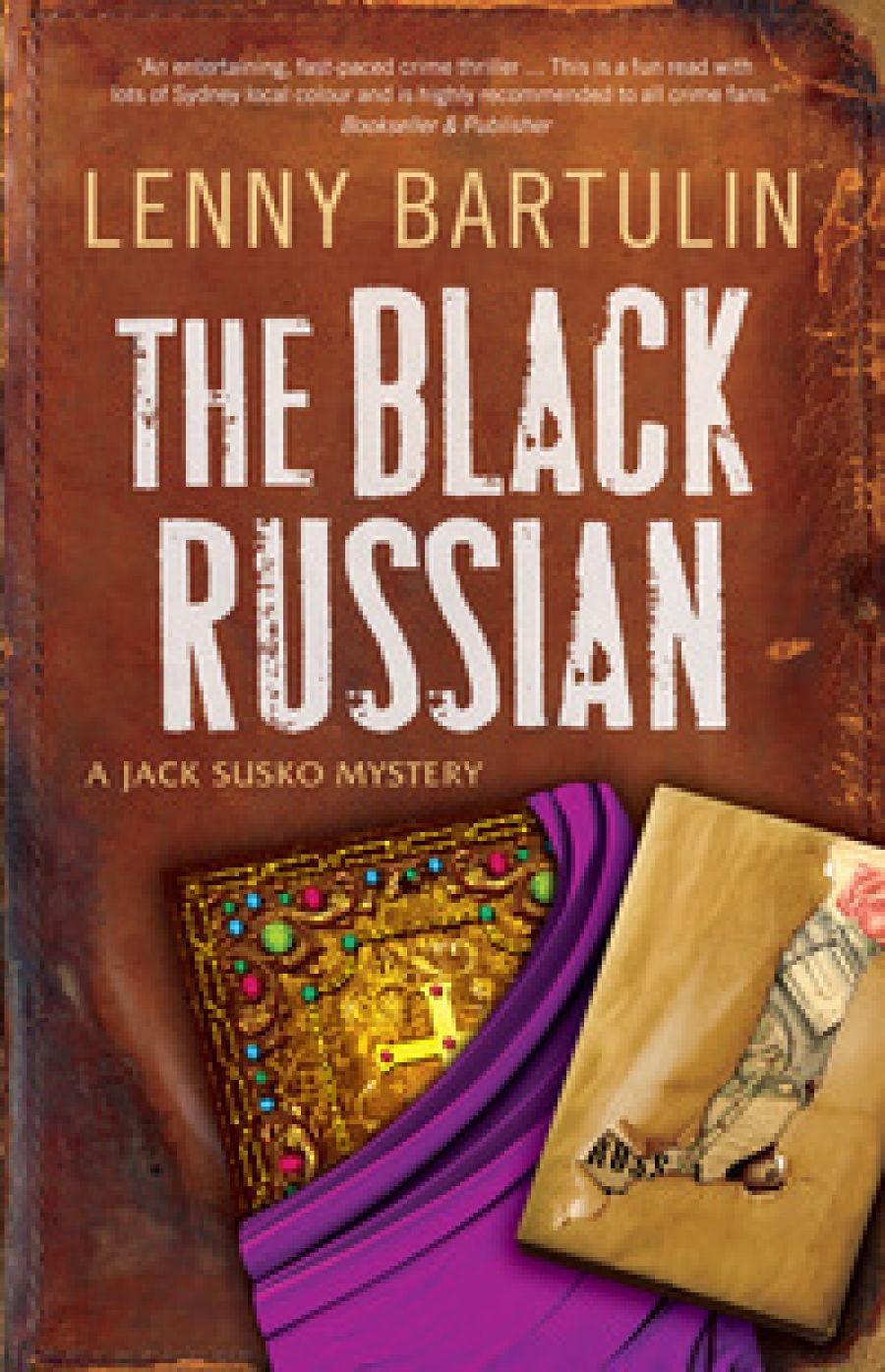
- Free Article: No
- Contents Category: Fiction
- Review Article: Yes
- Article Title: Soft-boiled schmuck
- Online Only: No
- Custom Highlight Text:
A purveyor of second-hand literature-cum-reluctant sleuth is an attractive proposition. We first met Jack Susko in Lenny Bartulin’s first novel, A Deadly Business (2008). Susko, a one-time employee of the notorious Ziggy Brandt, had finally established a legitimate (albeit struggling) business, Susko Books. Rarely troubled by customers, Susko was entertained by the music of Miles Davis and Muddy Waters, and alcohol.
- Book 1 Title: The Black Russian
- Book 1 Biblio: Scribe Publications, $27.95 pb, 272 pp
In The Black Russian, we are re-introduced to Susko as we left him: broke, disenchanted, and living alone. One scorching afternoon, he delivers a second-hand catalogue to a prestigious North Shore gallery, owned by an acerbic South African, Rhonda de Groot. Within minutes of Susko’s arrival, the gallery is held up by masked robbers. They raid the safe (though what they steal is initially a mystery). For good measure, they steal a first-edition From Russia with Love that Susko was due to deliver to his next client. Susko is immediately embroiled in the shady dealings of Rhonda’s businessman-husband, who does not wish to report the robbery to the police. He offers to pay Susko the value of the stolen book. Before he can claim the cash, Susko is drawn into further intrigue surrounding a valuable antiquity and an elusive Russian named Mr K.
Bartulin’s two plots are rather similar. Spousal deception and infidelity are once again rife; female characters in the story are undeveloped. This may be a deliberate generic ploy, but these women are hardly traditional femmes fatales, which makes their seduction of Susko, who capitulates with comedic ease to their minimal charms, all the more incredible. The settings are comparable, too. Bartulin’s Sydney is hot, grimy, and driven; its inhabitants are hardened individuals, struggling through their daily travails:
Jack could see how hot it was outside – saw it in the long, tired faces of the cabbies, the sweat-slicked hair of the couriers in their shit-box vans and four-tonne trucks, the council workers in fluoro vests and shorts, dragging tattooed forearms across their brows as they paused digging a trench.
This is not a pretty world. Even the quaint possibility of the bookshop, which is constantly ransacked, brings little romanticism.
While the literary references sprinkled through the story add some texture, they tend to be contrived. A dishevelled man who wanders into the shop, for instance, enquiring about reference books on cults and religion, merely facilitates an impressive list of thinkers and authors. As in A Deadly Business, Susko uses the Concise Oxford English Dictionary like a kind of crystal ball, pondering, for example, the ‘Meaning of Life’, which the COED surmises as ‘edible’. All this isn’t enough to draw you into Susko’s world, and it’s certainly not enough to convince us that he is a sensitive or philosophical man.
Like all good noir heroes, Susko is good with the sharp one-liners, but he doesn’t know when to hold his tongue and his quick wit gets him into a lot of trouble. Some of Bartulin’s similes are laboured – ‘The de Groot Maserati. It edged out onto the road, its front grille like the snout of a pissed-off guard dog, with someone tugging hard at the leash around its neck’ – while on occasion Bartulin loses all subtlety: ‘[Rhonda] looked fit, fifty and fucked off.’
The Black Russian may not be the finest of Australian crime fiction, but it’s entertaining in its way. Though the narrative loses impetus in the final third, Susko, for all his foibles, is an endearing sleuth.


Comments powered by CComment